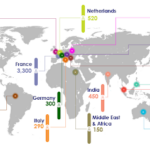
Elon Musk tweeted Saturday that Starlink, a division of his rocket company SpaceX will, « keep funding Ukraine govt for free. » There’s little doubt he’s talking about a preference his company stated in September to no longer lose money on what had recently been Musk’s signature PR achievement: Providing satellite internet to Ukraine amid Russia’s invasion.
In March, SpaceX delivered thousands of hardware kits to Ukraine. When Musk announced the move the previous month, there had been questions as to whether it was just a PR stunt, and whether Starlink would turn out to be useful at all.
But then it turned out it absolutely was useful. Essential even.
According to an October Tweet by Ukraine’s Vice Prime Minister, Mykhailo Fedorov, the dishes took over after more than 1,000 cruise missile targeted Ukrainian energy and transportation infrastructure. With Starlink equipment, Ukraine, « quickly restored the connection in critical areas, » according to Fedorov, who added, « Starlink continues to be an essential part of critical infrastructure. »
But in September, as Mashable’s Matt Binder wrote yesterday, Starlink sent a letter to the Pentagon, saying « We are not in a position to further donate terminals to Ukraine, or fund the existing terminals for an indefinite period of time. » The letter was also an invoice of sorts, requesting $124 million from the Department of Defense to recoup some $100 million in losses, and keep Starlink running in Ukraine through the end of 2022.
Some U.S. government funds had already been used in this way, according to reports that emerged in April. The September letter from SpaceX further detailed this cost-sharing system, in which, according to SpaceX, governments like that of the U.S. and Poland pay for the majority of the hardware, while SpaceX itself handles about 70 percent of the cost of internet connectivity.
In other words, despite Ukraine-friendly governments already bearing some of the burden, it’s clear that SpaceX is providing a service to Ukraine, and losing money in the process. If one values wartime generosity toward Ukraine, one might call this a « good deed. » Suddenly writing to the Pentagon demanding that it pay the piper would amount to, at best, the cessation of a good deed.
So on Saturday, Musk, who has the world’s highest individual net worth on most days, signaled that his good deed will continue. Though not without a healthy dose of self-pity.
However, it increasingly bears mentioning that Musk’s statements about his own intentions — particularly on Twitter — are often jokes, or are real promises that simply amount to nothing, and the line between those two categories is blurry.
In 2018, he concocted a vague plan to rescue a boys soccer team that had gotten stuck in a cave, but the submarine he provided proved to be useless. That same year, he said he would land cargo on Mars in 2022. There’s no sign that that will happen in the next 77 days. And that’s not to mention the whiplash the public is enduring as Musk announces, rescinds, and re-announces his plan to buy Twitter. Oh and he also challenged Vladimir Putin to « single combat. »
So if you’re someone who depends on Elon Musk’s generosity to maintain internet connectivity, Musk’s tweet is good news. But given the source, it would be wise not to get too comfortable.





